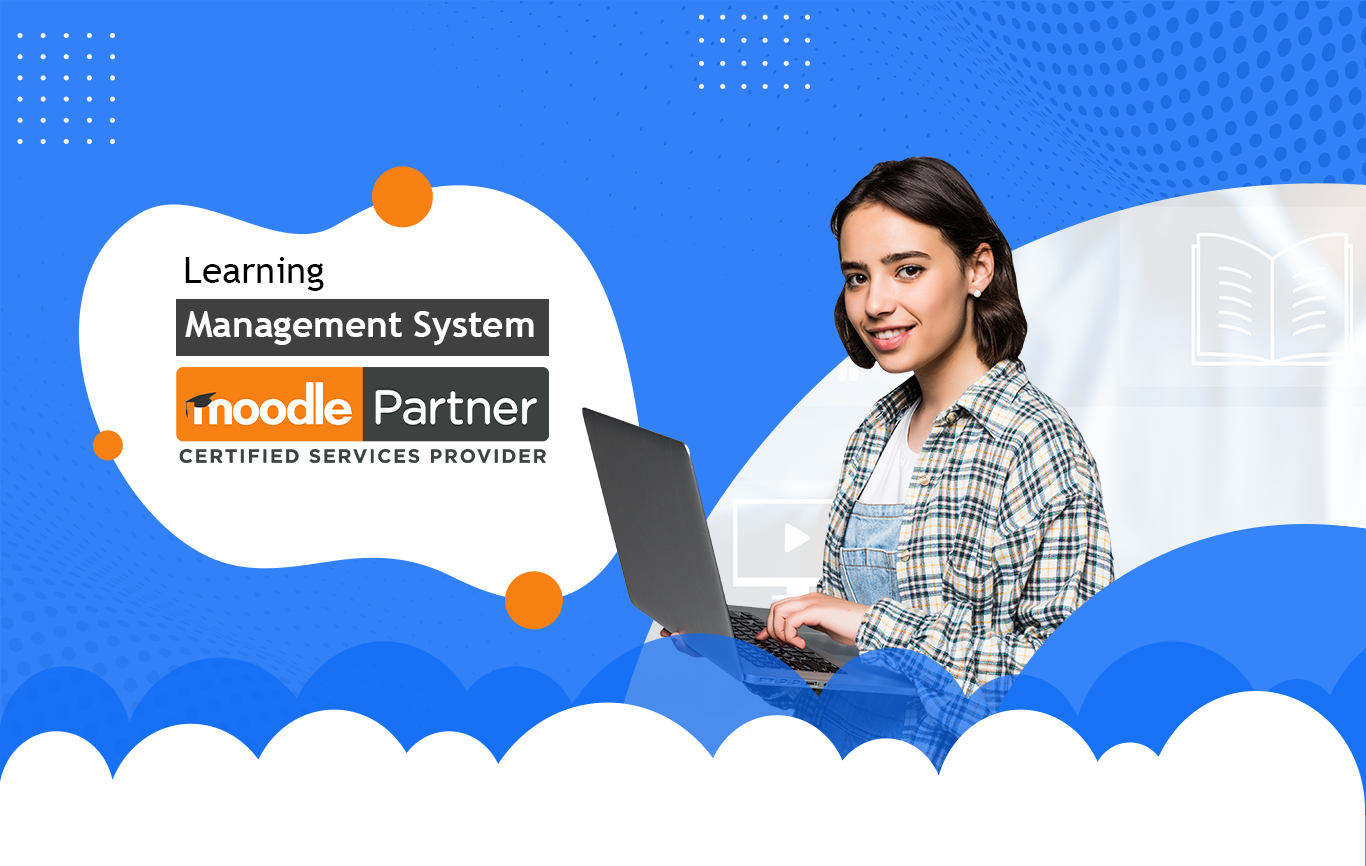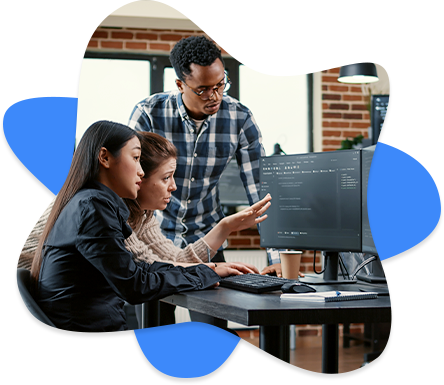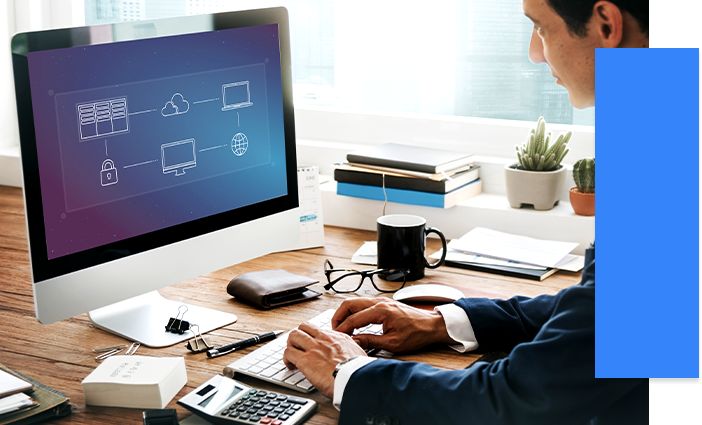

Learning Management System
A learning management system (LMS) is a software designed to manage the training courses and curriculum taught through digital medium. It is used in corporates as well as in academics.
In corporates, LMS provides a central repository for various employee courses and training programs. Employers may benefit from using an LMS because it helps them to track their employees’ learning and hence makes them more efficient, productive and increase profits. Even for educational institutions LMS comes with several features such as course scheduling, chat rooms, assignment submission, grading etc. These tools are important for academic institutions because they facilitate communication between instructors and students and improve the quality of teaching.
An LMS typically incorporates characteristics like tracking users, recording grades, scheduling classes/training sessions, managing course materials, etc.


Moodle which stands for ‘Modular Object-Oriented Dynamic Learning Environment’ is one of the most used LMS. It is a powerful open source learning management system (LMS) that empowers educators and trainers worldwide to engage their students and trainees effectively through personalized, user-friendly courses and activities. It is now widely adopted in higher education institutions and organizations around the globe. Moreover, it’s 1600+ open-source plugins makes it a robust, highly effective, customizable and scalable learning platform. Dynamic Pixel is proud to say that we are one of the Moodle partners. Moodle and dynamic Pixel have something common in their vision and that is to - empower educators and make the learning effective.

User Interface
Graphical user interface is very important to set the mood for learning. We believe in keeping things simple,
important options should be easily accessible and designs should look refreshing to eyes. With this perspective,
we create user-friendly graphical interfaces.
It is the interface via which a user communicates with the system. We make sure that the user interface is
easy to use and we have all the necessary tools required by the users. The user can access the LMS on any
device seamlessly due to its responsive design.
User Management
This LMS allows to create users in multiple ways like – creation of user by administrator, bulk uploading
of users, self-registration, etc. It also has pre-defined roles like Manager, Trainer/Teacher, Student, etc.
It also allows to create new roles and assign new capabilities to these roles.
With such robust user management and ability to customize roles with different capabilities, this LMS becomes
a standout product of e-learning industry.


Content Management and Bootcamp style Content Creation
With the capability to create categories and sub-categories it helps in keeps the courses organized. It has the capability to create Bootcamp style courses using its components like Assignment, Books, Nested Lessons, HTML Pages, Resources (like Videos, PDF, PPT, etc.), Chat, Choice, Certificates, Feedback, Forum, File, Glossary, External Links, Web Conferencing (using integration with apps like Zoom, etc.), Quiz, SCORM Packages, Surveys, Workshops, etc. One can create gamified and interactive courses and also enable adaptive learning for their learners.
Tracking and Reporting
This LMS keeps logs of all the user activities and hence generates a detailed report. It also keeps track of how many people have viewed the training courses for how much duration. With such robust tracking feature, you can monitor your users’ growth and gaps in their learning and hence take corrective actions.

Service Plans
As a trainer, you should consider using LMS software like Moodle because it provides comprehensive features to meet your training requirements. With the help of the online learning platform Moodle, you can access customized courses, get your company's branding and monitor your employees' learning and development. Additionally, it enables you to interact with the learners and promote interaction among them in forums and conversations.
Plan A
Moodle LMS on Client Server with Client Branding
In this plan, we install LMS to client's server. The client handles the server's management. Some of the key benefits of this plan are:
- No limitation on the number of users and storage as it's the client's server.
- We provide customization and branding of the company as per the client's requirements.
- We provide complimentary technical support for one year.
- There is only one-time fee for installation and customization. No recurring cost.
For detailed pricing plans, feel free to contact us.
Plan B
Moodle LMS Hosting with Client Branding
Some of our esteemed clients asked for Moodle LMS but they didn’t want to get into the headache of maintaining the server. So, to overcome this challenge, we started offering this plan where we install and configure a separate and dedicated Moodle LMS instance with client branding on Dynamic Pixel’s cloud server. Some of the key benefits of this plan are:
- Dedicated and customized LMS with client branding.
- Pay as you go model. We have different monthly, yearly and user-wise plan available. So, you can scale as per your requirement.
For detailed pricing plans, feel free to contact us.
Who can be our LMS users?
Business Organizations can use our LMS services for their employees. Even business organizations ranging from large multinational organizations to small and medium-sized can utilize learning management systems (LMS) for training. Other groups of users include-
- Non-governmental and charitable groups (NGOs)
- Business entities that offer advisory services
- Academic Establishments
- Internet-based and eLearning-based institutes of learning
- Independent coaches and instructors

How does availing an LMS beneficial for organization?
Although the switch from conventional, offline training to online learning may seem challenging, the rewards are well worth the effort.
Results in lower training costs
It is more economical to purchase our LMS software once and use it for your training programs
rather than to schedule new events each time you want to teach employees and clients.
Quick updation of information
Your training manuals no longer need to be obsolete. Once everything is online, you can instantly change your training material. Printed
materials and in-person demonstrations are less effective because you have to start over every time something changes.
Engage and inspire learners
Training doesn't necessarily include picking up new skills. It may be necessary to familiarize yourself with corporate rules or
understand compliance requirements. It might not seem tempting to train in those circumstances. To ensure employees
remain attentive, you can utilize our LMS to incorporate some interactivity and gamification elements.
Training can continue irrespective of location
Remote employees shouldn't pass up opportunities for training. Whether someone works from home or elsewhere, you don't have to invest the
time or money to bring them all together in one space. Our LMS platform may help create learning programs even when working remotely.
Track Learners Performance
Our learning management systems help you track your employees' performances. It can be used to keep tabs on how well each employee has
been doing throughout the course. This way, you will know if there's any room for improvement. You can also compare the performance of
different groups of employees. For example, you may want to see which group of employees performed better than others.

Bottom Line
Learning management systems (LMS) are essential tools for every organization. LMS helps learners, instructors, and other corporate staff to manage their curriculum and learning activities efficiently. We provide full and thorough maintenance and support for your Moodle-based LMS system. We have a committed team that can offer Moodle-specific knowledge, which can help you save valuable time.
